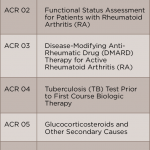“RISE is a tool designed by rheumatologists, for rheumatologists. I would encourage everyone to give it a try, watch our demo and learn about our results. We now have over 900,000 patient encounters, and the growth of the registry has been amazing. With your participation, it will develop into a powerhouse of knowledge. It’s so much easier than you imagine, and it’s worth it to you and your patients.”
—Dr. Salahuddin Kazi, chair of
the ACR’s Registries & Health
Information Technology Committee
May’s National Arthritis Awareness Month was the perfect opportunity for me to reflect on the work we do as rheumatologists and rheumatology health professionals. Our raison d’être is the patient, and our mantra is the commitment to improve their health and serve their welfare. We are also fortunate to have the support of the American College of Rheumatology (ACR) in this endeavor as dedicated volunteers and staff work tirelessly to promote high-quality care through innovation.

RISE has already captured data on more than 50,000 patients with RA.
Image Credit: Image Point Fr/shutterstock.com
Almost a year ago, the ACR launched the Rheumatology Informatics System for Effectiveness (RISE) Registry, an enhanced version of the Rheumatology Clinical Registry (RCR), that automatically syncs with electronic health records. In the brief time since its launch, RISE has captured data on more than 50,000 patients with rheumatoid arthritis (RA) and already stands among the largest rheumatology patient registries in the nation.
ACR developed RISE to become a best-in-class resource to help rheumatologists, rheumatology health professionals and researchers manage patient populations, improve patient care and navigate the ever-changing healthcare environment. It is designed to simplify the jobs of health professionals and enable systematic data collection without the burden of added data entry. RISE can identify performance gaps and facilitate better clinical decision making because of the knowledge it imparts about a provider’s practice. RISE provides real-time access to data, allowing customized quality-improvement queries and reports. Data from this registry also help the ACR identify and quantify the value of rheumatology care, which is vital when advocating to influencers and policy makers.
As the dependence on patient data grows in our evolving healthcare system, rheumatologists and other rheumatology healthcare providers will need increasing access to data collection tools and analytics that enable the documentation of quality of care. By signing up to participate in RISE, you can join the growing number of rheumatologists who recognize the value of membership in a national patient registry.
Benefits
RISE will allow the rheumatology provider to more easily:
- Optimize practice performance and patient care;
- Meet federal reporting requirements;
- Demonstrate value of rheumatology to key influencers (e.g., lawmakers, CMS, insurance sector); and
- Make new discoveries that advance rheumatology care and create solutions for more efficient healthcare delivery.
Continuing Success
We’ve come a long way in the past year, but we have a lot more work to do. This year, we aim to sign up at least 140 practices to contribute data to RISE. As of April, we had reached almost half our goal, with 69 practices connected—both private and academic—and 33 practices already contributing. If we continue at the pace of the first quarter, we will not only reach our goal for the year, but will exceed it.
RISE by the Numbers
- Practices signed up: 69
- Practices connected: 33
- Providers contributing data: 174
- Patient encounters: 923,780
- RA encounters: 310,952
- Patients: 216,131
- RA patients: 50,088
The power of RISE will increase with expanded data sets from a large number of member practices and rheumatologists across the country. A rich source of patient data will enable the ACR to bring added resources to the table and more effectively advocate on behalf of rheumatology. It will also allow the registry to develop more quality measures, which are critical to improving patient outcomes and advancing the field of rheumatology.



